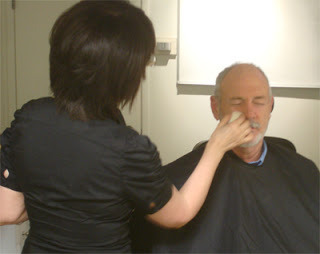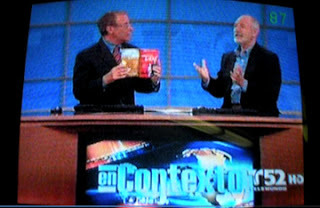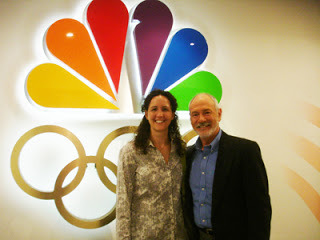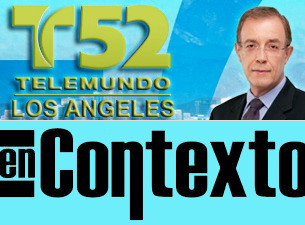Raul Ramos y Sanchez's Blog, page 21
May 6, 2011
In Columbus for Ohioanna Book Festival Saturday

If you are in the Columbus, Ohio area Saturday May 7, hope you can stop by and say hello. I will be at the Ohioanna Book Festival along with 70+ other Ohio authors greeting readers and signing books.
Free and open to the public
10:00 a.m. – 4:30 p.m.
OHIOANA BOOK FESTIVAL at Fort Hayes Metropolitan Education Center
Doors open to public at 9:45 a.m.
Fort Hayes Metropolitan Education Center
546 Jack Gibbs Blvd.
Columbus, OH 43215
Ohioanna website

[image error]
Published on May 06, 2011 06:59
May 2, 2011
Black in Latin America - Episode Two Review
 In episode two of Black in Latin America, Harvard scholar Dr. Henry Louis Gates, Jr. makes an admirable attempt to portray the long and complex history of Cuba's racial identity in less than an hour. Naturally, some elements are missing or compressed.
In episode two of Black in Latin America, Harvard scholar Dr. Henry Louis Gates, Jr. makes an admirable attempt to portray the long and complex history of Cuba's racial identity in less than an hour. Naturally, some elements are missing or compressed. One notable omission is an explanation for the absence of any significant indigenous ancestry among Cuba's population. The main reason for this is the tragic epidemics brought by European diseases following the arrival of Columbus in 1492. Cuba's natives had no immunities to European diseases such as smallpox, influenza and measles. Within 100 years after the first contact with Europeans, virtually the entire population of the sparsely populated island had died. As a result, most Cubans are descendants of European and African ancestors. This stands in contrast to many Latin American nations including the nearest neighbor to the United States, Mexico, where a majority of people are of indigenous and European descent.
Another of the episode's historical abbreviations is attributing the growth of African slavery in Cuba solely to the sugar plantation economy. Even before sugar became the white gold of the Caribbean mined by Spain, France and England with the blood and sweat of African slaves on the archipelago's islands, colonial Cuba had a shortage of laborers. As noted previously, the massive deaths of the indigenous populations compelled the often-haughty Spanish colonizers to import African slaves for agricultural and domestic labor. So the African influx into Cuba began earlier than the sugar plantation juggernaut of the late 1700s, albeit at a much reduced pace.
Despite these understandable omissions, I believe the essence of Dr. Gates' reporting is accurate. Cuba has never lived up to Jose Marti's ideal of a racially egalitarian society "by all and for all." Nor is Cuba the socialist racial paradise Castro would have you believe. But as a Cuban, I take pride in our diverse heritage and the progress the island has made toward the ideals on which an independent Cuba was founded. Cuba still has a very long way to go before those ideals are met. All the same, there is a lot the United States can learn from this small island when it comes to race relations.
Raul Ramos y Sanchez

[image error]
Published on May 02, 2011 23:23
Not a Time To Celebrate
The news of Osama bin Laden's death caught me totally unprepared. I imagine I am not alone. Osama bin Laden's name and face had become a relic of a time ten years ago when I was gripped by anger and anguish along with the rest of the nation.
After the shock of the 9-11 attacks passed, my reaction had been one of belligerence. I could not wait to fly again. I wanted the chance to show those fanatics who wanted to change my world that I would not cringe in fear. The depths of my hatred went so far as to imagine creating a cartoon of Osama bin Laden being sodomized by a pig. That's how angry I was at this man who had taken the lives of so many innocents because he felt morally superior to them.
Over time, that anger was tempered by the realization that there were leaders in the U.S. who were using these feelings of revenge to settle a personal political score with Saddam Hussein while deluding themselves with Clauswitzian geo-political claptrap. When the mission in Afghanistan was eclipsed by an unprovoked invasion of Iraq, the realization we were being hoodwinked was complete. I began to see Osama bin Laden as a dangerous lunatic made almost irrelevant by an equally dangerous foreign policy that would eventually cause many more deaths than the 9-11 attacks.
So the news of the bin Laden's death, while possibly the biggest story of this young century, seems empty of real consequence. (Somewhat fittingly, bin Laden's death overshadowed another gargantuan media frenzy devoid of any real meaning, the royal wedding.) Still, I was disturbed by the public reaction to bin Laden's death.
A death is never cause for celebration, even when the death is that of someone who had self-righteously ordered the deaths of thousands of innocents in the name of God. Most of those I saw celebrating were young people who were probably too young to grasp the tragedy of 9-11 when it happened and are too immature today to grasp how tawdry their behavior might appear to those who were truly touched by the suffering Osama bin Laden caused.
I cannot speak for those who lost loved ones in the 9-11 attacks. But I doubt many of them were among the cheering throngs gaily celebrating bin Laden's death like a college pep rally.
In reflecting on this act of justice, I'm left with the sobering realization that those who take pleasure in the taking of a life are only perpetuating the endless cycle of violence that has haunted our species and that we must eventually outgrow.
Raul Ramos y Sanchez
[image error]

After the shock of the 9-11 attacks passed, my reaction had been one of belligerence. I could not wait to fly again. I wanted the chance to show those fanatics who wanted to change my world that I would not cringe in fear. The depths of my hatred went so far as to imagine creating a cartoon of Osama bin Laden being sodomized by a pig. That's how angry I was at this man who had taken the lives of so many innocents because he felt morally superior to them.
Over time, that anger was tempered by the realization that there were leaders in the U.S. who were using these feelings of revenge to settle a personal political score with Saddam Hussein while deluding themselves with Clauswitzian geo-political claptrap. When the mission in Afghanistan was eclipsed by an unprovoked invasion of Iraq, the realization we were being hoodwinked was complete. I began to see Osama bin Laden as a dangerous lunatic made almost irrelevant by an equally dangerous foreign policy that would eventually cause many more deaths than the 9-11 attacks.
So the news of the bin Laden's death, while possibly the biggest story of this young century, seems empty of real consequence. (Somewhat fittingly, bin Laden's death overshadowed another gargantuan media frenzy devoid of any real meaning, the royal wedding.) Still, I was disturbed by the public reaction to bin Laden's death.
A death is never cause for celebration, even when the death is that of someone who had self-righteously ordered the deaths of thousands of innocents in the name of God. Most of those I saw celebrating were young people who were probably too young to grasp the tragedy of 9-11 when it happened and are too immature today to grasp how tawdry their behavior might appear to those who were truly touched by the suffering Osama bin Laden caused.
I cannot speak for those who lost loved ones in the 9-11 attacks. But I doubt many of them were among the cheering throngs gaily celebrating bin Laden's death like a college pep rally.
In reflecting on this act of justice, I'm left with the sobering realization that those who take pleasure in the taking of a life are only perpetuating the endless cycle of violence that has haunted our species and that we must eventually outgrow.
Raul Ramos y Sanchez

[image error]
Published on May 02, 2011 06:54
May 1, 2011
New America Media Radio Interview

During a visit to San Francisco last week, I had the privilege of being featured by New American Media producer Shirin Sadeghi in a radio interview with Irma Herrera aired on KALW 91.7 FM. Founded in 1996 by Pacific News Service, New America Media is a nationwide association of over 3000 ethnic media organizations representing the development of a more inclusive journalism. Along with being broadcast over the radio, my interview has been archived as a podcast on the New American Media website. You can listen below to the interview aired on Friday, April 29 and Sunday, May 1, 2011.
Over the last week, I've had the good fortune to appear in TV interview in Los Angeles and a radio interview in San Francisco. Now, I'm back in Ohio where my next appearance will be at the Ohioanna Book Festival next week. I want to once again express my thanks to my family, friends and colleagues for their support in launching HOUSE DIVIDED.
Raul Ramos y Sanchez

[image error]
Published on May 01, 2011 03:14
April 30, 2011
Radio Interview KALW in San Francisco
Could the United Nations some day recognize a Latino homeland within U.S. borders? This was one of the intriguing quesi

[image error]


[image error]
Published on April 30, 2011 18:24
April 29, 2011
Behind the scenes at my Telemundo interview
Thanks to the kind invitation from an NBC/Universal exec (whose name I will withhold in the interest of privacy), I had the privilege of appearing on En Contexto, the acclaimed Spanish-language news and commentary show hosted by veteran journalist Ruben Luengas airing nightly at 11PM PT on WKEA Channel 52 in Los Angeles. Below are some behind the scenes moments caught by my sister Ronda who accompanied me for the live interview on Wednesday April 27.
 Avoiding glare on the guest's extensive forehead was a challenge for the makeup artist.
Avoiding glare on the guest's extensive forehead was a challenge for the makeup artist.
 This photo was captured by my sister from the monitor in the green room.
This photo was captured by my sister from the monitor in the green room.
 My sister Ronda and the guest pose with the peacock. Four TV stations share the NBC complex in Los Angeles which is longer than a Tiger Woods tee shot. Fortunately, we were able to park close to the En Contexto studio. The golf carts inside the facility were an indication that not all visitors were so lucky. Walking through the corridors, led by our producer, we saw an assortment of backdrops and props lining the walls. After reaching the En Contexto studio, we found the show's producers, staff and host to be gracious and calm under the pressure of airing a live broadcast.
My sister Ronda and the guest pose with the peacock. Four TV stations share the NBC complex in Los Angeles which is longer than a Tiger Woods tee shot. Fortunately, we were able to park close to the En Contexto studio. The golf carts inside the facility were an indication that not all visitors were so lucky. Walking through the corridors, led by our producer, we saw an assortment of backdrops and props lining the walls. After reaching the En Contexto studio, we found the show's producers, staff and host to be gracious and calm under the pressure of airing a live broadcast.To all my friends who've requested more background reports on these events, my deepest thanks for your interest and support. I will post the interview video when it is available.
Raul Ramos y Sanchez

[image error]
Published on April 29, 2011 00:02
April 26, 2011
Late Night TV Interview Wednesday April 27
 Veteran journalist Ruben Luengas will interview me Wednesday night on his award winning Spanish-language news and commentary television show, En Contexto on KVEA Telemundo 52 in Los Angeles. We will be discussing the controversial topics of immigration and the Latino identity explored in my second novel HOUSE DIVIDED. You can watch live online at the link below. Hope you can join us -- especially if you're an Eastern timezone insomniac. I'll have you asleep in no time.
Veteran journalist Ruben Luengas will interview me Wednesday night on his award winning Spanish-language news and commentary television show, En Contexto on KVEA Telemundo 52 in Los Angeles. We will be discussing the controversial topics of immigration and the Latino identity explored in my second novel HOUSE DIVIDED. You can watch live online at the link below. Hope you can join us -- especially if you're an Eastern timezone insomniac. I'll have you asleep in no time.Wednesday April 272AM Eastern - 11PM PacificKVEA Channel 52 - Los AngelesorWatch live online HERE
Hope you can join us!
Raul Ramos y Sanchez

[image error]
Published on April 26, 2011 10:54
TV Interview Wednesday 4-27 at 8PM ET & 11PM PT
[image error]
Veteran journalist Ruben Luengas will interview me Wednesday night on his award winning Spanish-language news and commentary television show, En Contexto on KVEA Telemundo 52 in Los Angeles. We will be discussing the controversial topics of immigration and the Latino identity explored in my second novel HOUSE DIVIDED. You can watch live online at the line below. Hope you can join us.
Wednesday April 27
8PM Eastern - 11PM Pacific
KVEA Channel 52 - Los Angeles
or
Watch live online HERE
Hope you can join us!
Raul Ramos y Sanchez
[image error]

Wednesday April 27
8PM Eastern - 11PM Pacific
KVEA Channel 52 - Los Angeles
or
Watch live online HERE
Hope you can join us!
Raul Ramos y Sanchez

[image error]
Published on April 26, 2011 10:42
April 24, 2011
Black in Latin America - Episode One Review

I applaud Dr. Henry Louis Gates, Jr. for exposing U.S. viewers to the diversity of Latin America's people in this landmark series. When most U.S. citizens think of a Latino, they rarely picture someone black. This series broadens our understanding of the very complex identity of people from Spanish-speaking countries, an identity that is usually oversimplified into misleading racial stereotypes in the U.S. media. Just like the United States, Latin America's population is composed of immigrants from every corner of the planet along with indigenous local people and African slaves. Moreover, the blending of ancestries is not even mix across Latin America--often showing a predominance of one ancestral group within regions of a single country. It is in this respect, that the first episode of Dr. Gates' series displayed some shortcomings.
The scenes from the first episode in the Dominican Republic were shot in a section of Santo Domingo where most of the people are of African descent. A visit by Dr. Gates to other parts of the Dominican Republic where European or indigenous ancestry are more common would have broadened the U.S. public's perspective of the nation's diversity.
In a more serious shortcoming of this episode, Dr. Gates appeared to judge the people of African descent in the Dominican Republic according to his own racial standards by implying they were in denial about their heritage because they did not abide by the U.S. "one drop rule" for establishing black identity. Dr. Gates seemed to find it troubling that people of mixed ancestry (like Dr. Gates himself), would not accept the same identity he embraced.
Most scholars agree that "race" is primarily a social construct. In reality, the labels White, Black, Asian and Hispanic (which most Americans accept as legitimate racial/ethnic categories) are simply identities that exist primarily within the borders of the United States. Outside the United States, the nations and people lumped within these arbitrary categories show little propensity for unity. Although unintended, I feel Dr. Gates imposed some of his own nationalistic hubris in this episode.
Despite these flaws, I support Dr. Gates and his attempt to broaden our perspectives. The most important thing he has done is to open our eyes -- and open a dialog.
Raul Ramos y Sanchez

[image error]
Published on April 24, 2011 07:37
April 18, 2011
Black in Latin America
Collaborator on my public TV film project, Professor Henry Louis Gates, Jr., introduces a series on Afro-Latinos--a group virtually invisible in the mainstream media and most discussions of Hispanics. This despite the fact more people of African descent in the Americas today speak Spanish or Portuguese rather than English. This must-see series starts tomorrow night on PBS.

[image error]


[image error]
Published on April 18, 2011 06:25



